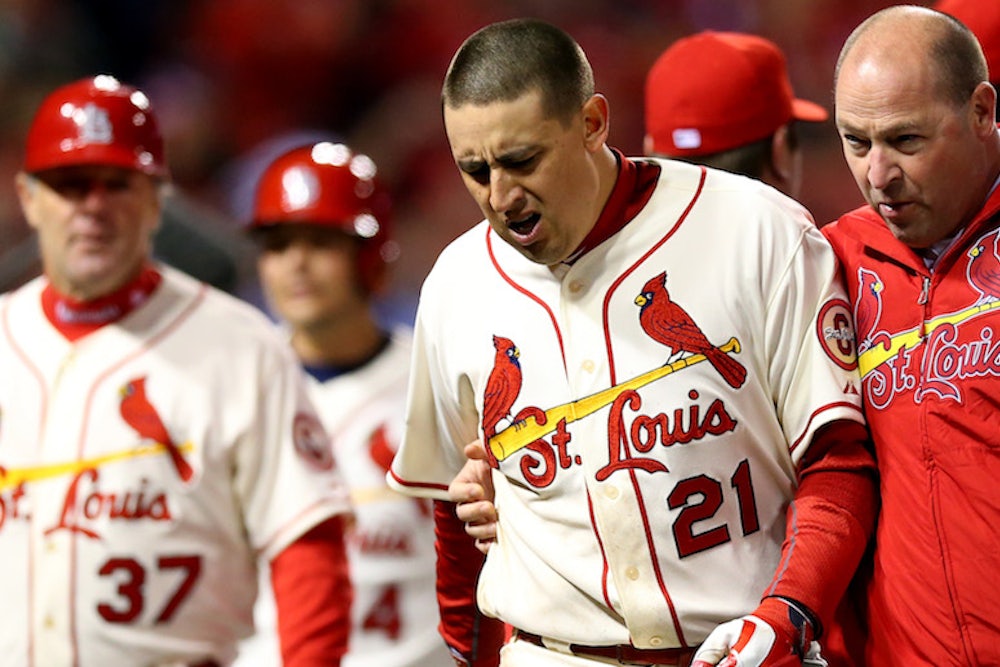The Boston Globe, The Grio, and The Los Angeles Times have all run versions of the same article about the World Series, which heads into tonight’s Game Five in St. Louis with the Cardinals and the Boston Red Sox tied at two games apiece. The short of it: Of the 50 players on the two teams’ playoff rosters, only one—a back-up, no less (Boston’s Quintin Berry)—is African-American. This category admittedly does not include players like Boston slugger David Ortiz, a Dominican-American of African descent. But that’s precisely the point: This is cultural, not racial. African-Americans dominate football and especially basketball, but just 8.5 percent of Major League Baseball players on Opening Day rosters were self-identified African-Americans. And this is in the sport of Satchel Paige and Jackie Robinson, Willie Mays and Hank Aaron, Bob Gibson and Lou Brock, Ken Griffey, Jr. and Barry Bonds.
There are two questions to ask: Why? And: Why should we care?
The why is more easily answered. The most talented black athletes are more likely to turn to basketball or football. Despite baseball’s origins in Brooklyn and high school football’s dominance in the rural South, football and basketball read as more urban—paeans to baseball as an essentially pastoral pastime exist for a reason. Baseball scholarships are less generous, which is bound to put a crimp on a socioeconomically disadvantaged minority. There are less blacks in MLB leadership positions; no Rooney Rule aiming to ensure black managers, no black-dominated culture as in the National Basketball Association. Plus, there is the game itself. “Baseball is a classical sport caught up in a hip-hop world,” writes the Globe’s Gary Washburn, essentializing but nonetheless speaking undeniable truth.
Baseball is actively seeking to increase its African-American fanbase and player-base, including through a much-touted program called Reviving Baseball in Inner Cities (RBI, get it?). Its name—“inner cities,” presumably like Bed-Stuy, land of the $2.75 craft doughnut—betrays the general tone-deafness of the project. One can sense in such efforts the neurosis that losing black fans and players is a bigger problem than losing the fans and players of a different, similarly-sized constituency would be. You can see this anxiety from the other side, too: When rising Atlanta Braves star Jason Heyward debuted a few years ago, Hank Aaron openly hoped that Heyward would be a harbinger for more black interest in the sport: “I was talking to [civil rights pioneer and former Atlanta mayor] Andrew Young about the same thing,” Aaron said, “and he wants me to bring him out there to meet Heyward. It's beginning to move through the black area. People are getting excited.”
So partly this is about maintaining what has in the past been one of the most vital pathways for black acceptance into and by mainstream (read: white) America. “You’ll never know how easy you and Jackie and [Larry] Doby and Campy [Roy Campanella] made it for me to do my job by what you did on the baseball field,” Martin Luther King, Jr. told Don Newcombe, referring to other African-American baseball trailblazers. But, of course, since Robinson's 1947 milestone we have gained the NBA and the National Football League for that, as well as innumerable legal and social advances. Besides, it is not like baseball is lacking for diversity, given how the game is taking an increasingly Latin flavor and is as popular and important in several East Asian countries as it is in its birthplace.
Has anybody considered acceptance? Surely there should be efforts to have more African-Americans and other minorities in management and ownership positions (although it is worth noting that in all the Big Four team sports, there is only one black majority owner, and that is the rule-proving exception of Michael Jordan). Beyond that, though, it might be okay if next year there is not even a single African-American in the World Series, and not only because that might mean the Red Sox did not make it again. From baseball’s perspective, while nothing has tracked the end of the monoculture like its decline from America’s Pastime to Another Popular Sport, it can still thrive as a celebrated yet ultimately niche diversion—the definition of basically everything in American culture today besides professional football. And as for African-Americans, many of their feelings that they need not participate in a popular American pursuit is a sign not of their estrangement from the mainstream, but their place in it. Nothing says, “We belong” generally like feeling the freedom and confidence to say, “No thanks” to something specifically.
